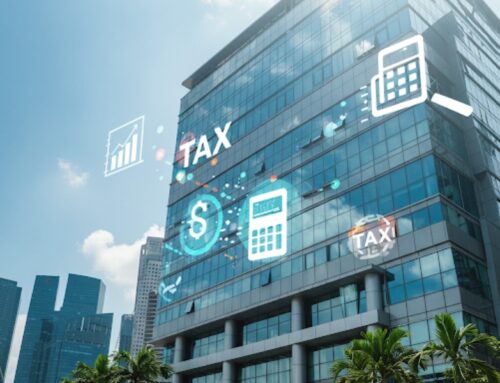The personal income tax rates in Singapore are progressive. Here is a guide to which income types are taxable and which are not. Here are some key features of Singapore’s personal income tax system.
- Singapore’s personal income tax system has a progressive tax structure for residents. The tax rates start at 0% and tops out at 22% for incomes above SGD$320,000.
- Tax rates and rules are dependent on the tax residency of the individual.
- There are no capital gains or inheritance taxes in Singapore.
- Individuals are taxed only on income earned in Singapore. (Income earned by individuals working overseas are generally not taxed. There are exceptions to the rule)
- The tax filing deadline for personal income taxes is on the 15th of April annually for paper filing and the 18th of April annually for e-filing. Personal income tax is assessed on a preceding year basis. (i.e. for personal income taxes filed in 2021, the income to be declared is for the period 1st January 2020 to 31st December 2020.)
You are considered a tax resident if you are:
- A Singaporean
- A Singapore Permanent Resident who is residing in Singapore
- A foreigner who has stayed and/ or worked in Singapore for 183 days or more in the year
Chargeable income for the tax residents is calculated as
Total income
Less: Expenses
Equals: Statutory Income
Less: Donations
Equals Assessable Income
Less: Personal Reliefs
Equals: Chargeable Income
Definitions:
Total income:
- gains or profits from any employment
- profits from carrying on of any business, trade, profession or vocation as a sole proprietor or partner in a partnership
- dividends, interests, investment income
- rents, royalties, premiums, and other profits arising from properties
- exclude qualified income earned overseas
Expenses:
- qualified employment-related expenses
- qualified rental-related expenses
Statutory:
- Permitted
Donations:
- Donations to IPCs, IPC facilities, events, or programmes
- Donations to name facilities of approved beneficiaries (including artefacts and public sculptures) under any of the other approved donation programmes
- Donations under any of the approved donation programmes where the IPC or approved beneficiary acknowledges the donation by including the donor’s name or logo in the IPC’s collaterals (e.g. banners, publications, advertisements)
Assessable Income:
- Income to be assessed before factoring reliefs
Personal Reliefs:
- Reliefs such as course fees relief, CPF cash top-up relief, earned income relief, life insurance relief, NSMan (self) relief, parent/ handicapped parent relief, NSMan (parent) relief, qualifying/ handicapped child relief, foreign domestic worker levy relief, grandparent caregiver relief. The full list of reliefs can be found here.
Chargeable Income:
- Income that will need to be taxed. This is the amount to use when referring to the Personal Income Tax Rates table
Here are the Personal Income Tax Rates
| Chargeable Income | Income Tax Rate (%) | Gross Tax Payable ($) |
|---|---|---|
| First $20,000 | 0 | 0 |
| Next $10,000 | 2 | 200 |
| First $30,000 | - | 200 |
| Next $10,000 | 3.50 | 350 |
| First $40,000 | - | 550 |
| Next $40,000 | 7 | 2,800 |
| First $80,000 | - | 3,350 |
| Next $40,000 | 11.5 | 4,600 |
| First $120,000 | - | 7,950 |
| Next $40,000 | 15 | 6,000 |
| First $160,000 | - | 13,950 |
| Next $40,000 | 18 | 7,200 |
| First $200,000 | - | 21,150 |
| Next $40,000 | 19 | 7,600 |
| First $240,000 | - | 28,750 |
| Next $40,000 | 19.5 | 7,800 |
| First $280,000 | - | 36,550 |
| Next $40,000 | 20 | 8,000 |
| First $320,000 | - | 44,550 |
| In excess of $320,000 | 22 |
The employment income of non-residents is taxed at the flat rate of 15% or the progressive resident tax rates (see table above), whichever is the higher tax amount.
Tax treatment of employee benefits
Benefits that you receive as an employee are also taxed. These include:
- Accommodation and housing allowance
- Vehicle allowance (if a vehicle is provided or if milage on private cars are reimbursed)
- Monthly transport allowance
- Overtime pay
- Allowance for overseas trips
- Reimbursements on medical and dental treatments for dependants
- Other relevant allowances (meal, phone bill)
Tax treatment of income earned overseas
Income earned overseas and received in Singapore is generally not taxable. You do not need to declare this income in your tax returns.
The exceptions where income earned overseas is taxable are:
- It is received in Singapore through partnerships in Singapore
- The overseas employment was part of your Singapore employment.
- You are employed by the Singapore Government to work outside of Singapore
Tax treatment on capital gains, inheritance and estate
Singapore does not have capital gains and estate duties. There are inheritance taxes.
Filing personal income tax returns
Filing your personal income tax returns is an annual obligation for all eligible taxpayers. All hardcopy submissions need to be submitted by the 15th of April and e-filings are to be done by the 18th of April.
The relevant forms are the following:
- Form B1 – for tax resident individuals
- Form B – for self-employed individuals
- Form M – for non-resident individuals
Once you filed your returns, you should receive your income tax bill within the next few months. The tax bill will indicate the amount of tax that you will need to pay. If you do not agree with the stated amount, you will need to inform IRAS within 30 days of receiving the tax bill with the reasons for your objection. If you do not pay your tax bill within 30 days of the notice, penalties will be imposed.
There are penalties for late filing or non-filing of personal income taxes. IRAS may take actions against you for the non-filing or non-payment of income taxes.
Here is an article about the consequences of not paying taxes:
What are the consequences of not paying my taxes?
If you need assistance with your corporate tax filing, you may contact us at [email protected].
When in doubt, seek legal advice or consult an experienced ACRA Filing Agent.
Yours Sincerely,
The editorial team at Singapore Secretary Services
For more useful articles and videos, visit the Singapore Secretary Services resource page.
Related articles:
How to file corporate tax returns for companies
Should I register a private limited as a freelancer?
Do I need to pay corporate tax on income that is derived outside of Singapore?
What are the consequences for late filing or non filing of Corporate Income Tax Returns?
How much do I have to pay in taxes as a start up company in Singapore?







[…] again upon us! Please note that personal and corporate tax filing deadlines are very different. Personal income taxes are to be filed by April and corporate income taxes are to be filed by […]